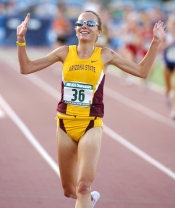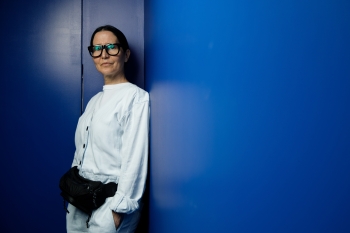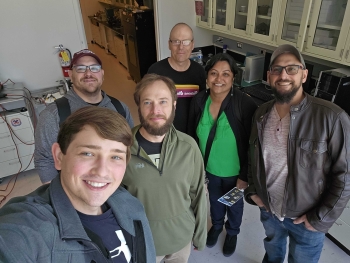How the humanities play a crucial role in current conversations

ASU students working on research for a class. Photo by Thomas Skrmetti
“What are you supposed to do with that degree?”
This question is often asked, particularly about degrees that fall under the humanities. English, history and language are subjects that come with the curiosity of what career path the degree can lead to. But these programs can prepare students to take on a wide range of careers, and enable them to become involved in timely and complicated conversations.
Many current issues require the ability to problem-solve, think critically and analyze the past. Consider questions such as: Why is it important to establish protections for student athletes? What are different ways to decrease environmental impact and improve working conditions in the fashion industry? How will scientists ethically research planets within and outside our solar system?
Humanities Week at ASU
Join The College of Liberal Arts and Sciences for Humanities Week, Oct. 21–25, where you can learn more about how a humanities background can help you navigate any conversation or industry.
In honor of Humanities Week at ASU, we explore how all of these questions can find answers in the humanities.
Diving deep into the narrative of sports
What is a record-breaking season without its history to back it up? Over a century of data for professional and collegiate teams determines how future conversations and deals will play out. The humanities have been ingrained in the sports world since its inception.
“History, tradition and legacy are all part of the culture and fabric of a sports club or team, and people who are fans of sports as well as people who work in sports understand this intimately,” said Victoria Jackson, a sports historian and clinical associate professor of history in the School of Historical, Philosophical and Religious Studies at Arizona State University.
“A great way to think about the importance of history is with European and Latin American soccer clubs or American college football teams and their fan bases, whose attachments and pride in fan identity run deep because of the ability to connect to century-plus-long traditions and heritage.”
Over the past few years, college athletics have been reshaped due to Supreme Court rulings against the NCAA over the ability of student athletes to have more ownership over their identity. The 2021 Supreme Court ruling in NCAA v. Alston countered the NCAA’s founding principles of collegiate amateurism and granted student athletes the ability to be compensated for the use of their name without facing severe penalties.
“NIL"Name, Image and Likeness" (NIL) is a term that describes the means through which college athletes are allowed to receive financial compensation. has restored to students who play sports the economic rights of all students,” Jackson said. “Schools had restricted athletes from making money thanks to their athletic skills and notoriety, and meanwhile other students with different forms of talent could do so without losing their ‘eligibility’ or scholarship monies.”
Jackson, a former NCAA athlete, is the co-director of the Sports @ HI Initiative and co-founder of ASU’s Great Game Lab with Andrés Martinez.
“We are using the opportunity of the North America-hosted 2026 Men’s World Cup and the 2028 Los Angeles Olympic and Paralympic Games to explore two phenomena: how the U.S. connects to the rest of the world through sport, and how the two footballs — American football and soccer football — appear to be converging,” Jackson said. “We look forward to engaging our global ASU community with events, learning opportunities, resources and new research.”
Jackson has seen many humanities graduates enter the sports industry in media, communications, law and other pathways.
“Sports reveal the heart and soul of the human experience,” she said.
Moving the needle on sustainable fashion
Affordability and ethical sourcing have become a hot topic in the debate between fast fashion and sustainable garments.
Jill Stein is a futures and design graduate student at ASU who became involved in the Sustainable Fashion Humanities Lab program in previous semesters. Thanks to a Beyond the Lab grant, Stein and fellow graduate student Vidit Sharma are taking a deeper look into sustainable fashion production.
“We’re looking at sustainability beyond materiality. You’re looking at innovation in terms of products. You’re looking at things that would be sustainable,” Stein said. “This is much more of a global crisis. Fashion is the number two culprit in terms of climate change behind agriculture. We’re at an inflection point in this crusade.”
In collaboration with ASU FIDM, Sustainable Fashion Week and fiber company Supima, Stein and Sharma are working on several projects to explore fashion design practices beyond traditional materials to engage students and industry leaders — including undergraduate course projects, a focus group and a Sustainable Fashion Week panel that hosts experts and leaders in the industry.
“Fashion is ubiquitous," Stein said. "We all engage in it, and everyone has an opinion about it. ... People that have a humanities background are inclined to view the world through a lens that’s more humanistic. You can ask yourself ‘What is bothering me?’ or ‘What’s wrong with this picture?’ and that curiosity will lead you to these spaces.”
Stein looks forward to contributing to positive changes in the fashion industry and doing good for the companies she works for. She’s investigating business ethics, such as fair labor and wage practices, and “greenwashing,” a term used to describe public relations and marketing tactics that make a company's initiatives, operations and products seem more environmentally friendly than they are.
“The Humanities Lab and this program allows you to pursue something that bothers you, those things that keep you up at night. That’s where innovation is born,” she said.
Implications of exploring new frontiers
How can philosophy and ethics inform space exploration, and what are the potential environmental impacts of setting foot on Mars?
Thomas Skrmetti graduated this past spring with a bachelor’s degree in astronomical and planetary sciences from the School of Earth and Space Exploration, where his experience with the Online Undergraduate Research Scholars, or OURS, program helped him secure a NASA internship.
While at NASA, Skrmetti found himself constantly applying the skills he learned through his first degree in philosophy in contributing to conversations surrounding Mars exploration.
“One of the things I'm passionate about with Mars exploration is that we don't know the ethical ramifications of environmentalism for Mars itself and we don't want to screw up any life that might be there by going,” Skrmetti said. “No matter how clean you make something, you're always going to have bacteria on it and you don't want to cross-contaminate. You don't want to end up accidentally destroying whatever is on Mars or any other planet.”
Through his studies and experiences, Skrmetti learned how scientists approached aspects of space exploration. Some would focus on researching the data points and how to get there, while the others would analyze those findings to ensure ethical solutions and approaches to space sciences.
“When you start to mix the humanities with science, suddenly those ethical concerns come to the forefront and you're concerned about whether or not we are going to mess up the biology that might be on Mars, or the question of are we going to mess up the biomes on Earth by going there and coming back? Is it OK for us to go there and colonize?” Skrmetti said.
“There are a lot of different philosophical questions that come up, and being able to look at it through scientific and humanistic lenses helps.”
More Arts, humanities and education

Grand Canyon National Park superintendent visits ASU, shares about efforts to welcome Indigenous voices back into the park
There are 11 tribes who have historic connections to the land and resources in the Grand Canyon National Park. Sadly, when the park was created, many were forced from those lands, sometimes at…
ASU film professor part of 'Cyberpunk' exhibit at Academy Museum in LA
Arizona State University filmmaker Alex Rivera sees cyberpunk as a perfect vehicle to represent the Latino experience.Cyberpunk is a subgenre of science fiction that explores the intersection of…

Honoring innovative practices, impact in the field of American Indian studies
American Indian Studies at Arizona State University will host a panel event to celebrate the release of “From the Skin,” a collection over three years in the making centering stories, theories and…


